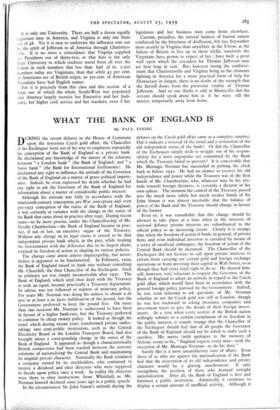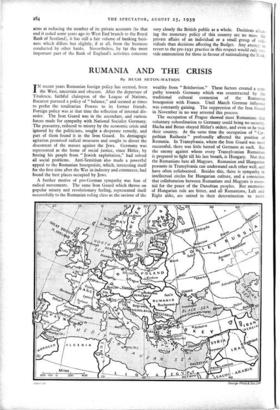WHAT THE BANK OF ENGLAND IS
By PAUL EINZIG
DURING the recent debates in the House of Commons upon the notorious Czech gold affair, the Chancellor of the Exchequer went out of his way to emphasise repeatedly his conception of the Bank of England as a private bank. He disclaimed any knowledge of the nature of the relations between " a London bank " (the Bank of England) and " a Swiss bank " (the Bank for International Settlements). He disclaimed any right to influence the attitude of the Governor of the Bank of England on a matter of grave political import- ance. Indeed, he even expressed his doubt whether he had any right to ask the Governor of the Bank of England for information about a matter of considerable public interest.
Although his attitude was fully in accordance with the nineteenth-century conception, pre-War conception and even pre-1931 conception of the status of the Bank of England, it was certainly at variance with the change in the status of the Bank that came about in practice after r93r. During recent years—to be more precise, under the Chancellorship of Mr. Neville Chamberlain—the Bank of England became in prac- tice, if not in law, an executive organ of the Treasury. Without any change in its legal status it ceased to be that independent private bank which, in the past, while treating the Government with the deference due to its largest client, retained its freedom of action in shaping its various policies.
The change came about almost imperceptibly, but never- theless it appeared to be fundamental. In February, 1929, the Bank of England raised its bank rate without consulting Mr. Churchill, the then Chancellor of the Exchequer. Such an arbitrary act was simply inconceivable after 1931. The Bank of England, which until then dealt with the Treasury as with an equal, became practically a Treasury department. Its advice was not followed in matters of monetary policy. For years Mr. Norman was doing his utmost to obtain a de jure or at least a de facto stabilisation of the pound, but the Government preferred to keep the pound free. On more than one occasion Mr. Norman is understood to have been in favour of a higher bank-rate, but the Treasury preferred to continue its cheap money policy. It looked as though the trend which during recent years transformed private under- takings into semi-public institutions, such as the Central Electricity Board or the London Transport Board, had also brought about a corresponding change in the status of the Bank of England. It appeared as though a characteristically British compromise had been reached between the extreme solutions of nationalising the Central Bank and maintaining its original private character. Nominally the Bank remained a company owned by its stockholders, who continued to receive a dividend and elect directors who were supposed to decide upon policy once a week. In reality the directors were there to obey instructions from Whitehall, as Mr. Norman himself declared some years ago in a public speech. In the circumstances Sir John Simon's attitude during the debates on the Czech gold affair came as a complete surprise. Did it indicate a reversal of the trend and a restoration of the old independent status of the bank? Or did the Chancellor of the Exchequer simply wish to wriggle out of his respon- sibility for a most unpopular act committed by the Bank which the Treasury failed to prevent? It is conceivable that Mr. Montagu Norman has succeeded in putting the clock back to before 1931. He had no chance to recover his old independence and power while the Treasury was in the firm hands of Mr. Chamberlain, who, whatever may be his atti- tude towards foreign dictators, is certainly a dictator in his own sphere. The moment the control of the Treasury passed into the much more subtle but much weaker hands of Sir John Simon it was almost inevitable that the balance of power of the Bank and the Treasury should change in favour of the former Even so, it was remarkable that this change should be allowed to take place at a time when in the interests of national defence private interests are subordinated to the official policy to an increasing extent. Clearly it is strange that when the freedom of action of banks in general, of private firms and even individual investors is curtailed by means of a series of unofficial embargoes, the freedom of action of the Central Bank should be increased. The Chancellor of the Exchequer did not hesitate to call upon private interests to refrain from carrying out certain gold and foreign exchange operations or from investing their capital in Wall Street, even though they had every legal right to do so. He showed him- self, however, very reluctant to request the Governor of the Bank of England to adopt an attitude in regard to the Czech gold affair which would have been in accordance with the general foreign policy pursued by the Government. Indeed, he was even reluctant to ask questions of Mr. Norman whether or not the Czech gold was still in London, though he was less backward in asking insurance companies and investment trusts to give the details of their foreign invest- ments. At a time when every section of the British nation willingly submits to a certain curtailment of its freedom in the public interest, it sounds strange that the Chancellor of the Exchequer should feel that of all people the Governor of the Bank of England should not be asked to make such a sacrifice. His motto (with apologies to the memory of Nelson) seems to be, " England expects every man—with the exception of Mr. Montagu Norman—to do his duty."
Surely this is a most unsatisfactory state of affairs. Even those of us who are against the nationalisation of the Bank feel that the restoration of its old independence and private character would be a glaring anachronism. It only strengthens the position of those who demand outright nationalisation. After all, the Bank of England is first and foremost a public institution. Admittedly it continues to display a certain amount of unofficial activity. Although it aims at reducing the number of its private accounts (to that end it ceded some years ago its West End branch to the Royal Bank of Scotland), it has still a fair volume of banking busi- ness which differs but slightly, if at all, from the business conducted by other banks. Nevertheless, by tar the most important part of the Bank of England's activities concerns very closely the British public as a whole. Decisions air ing the monetary policy of this country are no more ti,.! private affairs of an individual or a small group of indi_ viduals than decisions affecting the Budget. Any attemp to revert to the pre-1931 practice in this respect would only rro_ vide ammunition for those in favour of nationalising the ILnk.









































 Previous page
Previous page